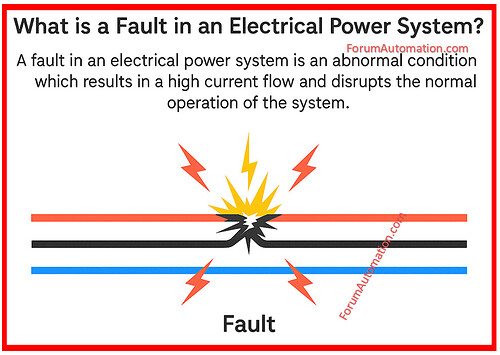What is a Fault in an Electrical Power System?
A fault in an electrical power system is an abnormal condition that disturbs the regular flow of electricity, usually caused by
- Short circuits,
- Open circuits (or)
- Equipment failure.
It creates significant current flow and voltage drops, which can lead to system damage, device failure, or catastrophic outages if not rapidly separated.
Types of Electrical Faults
Short Circuit Faults
- Line-by-Line Fault (L-L)
- Line to Ground Fault (L-G)
- Double Line to Ground Fault (L-L-G)
- Three-Phase Fault (L-L-L or L-L-L-G).
Open Circuit Faults
This happens when a conductor is broken (or) disconnected.
This causes voltage imbalance (or) load loss.
Symmetrical Faults
Include all 3 phases equally (for example, a 3-phase short circuit).
Less common, but more severe.
Unsymmetrical Faults
Affect one (or) two phases (more often).
Include the L-G, L-L, & L-L-G types.
Causes of Electrical Faults
- Equipment insulation failure
- Lightning strikes
- Overloading
- Mechanical damage to the conductors
- Human error (or) switching errors.
- Ageing of cables & components
- Tree branches (or) animals come into touch with lines.
Effects of Electrical Faults
- Voltage instability.
- Insulation breakdown.
- Tripping relays and breakers
Fire Hazards
- Grid Collapse (under Extreme Conditions)
- Protection Against Faults
- Fault Protection: Circuit Breakers will automatically disconnect the faulty section.
- Relays: detect abnormal situations and trigger breakers.
- Fuses: Fuses melt under extreme current.
- Grounding Systems: Directing fault current securely to the earth
- Lightning Arresters: Protect against surge voltages.
Power system faults require immediate detection and isolation to protect equipment, assure safety, and maintain uninterrupted power supply. Modern protection systems & SCADA serve a significant function in real-time problem management.
You can also follow us on AutomationForum.co, Facebook and Linkedin to receive daily Instrumentation updates.
You can also follow us on ForumElectrical.com , Facebook and Linkedin to receive daily Electrical updates.
